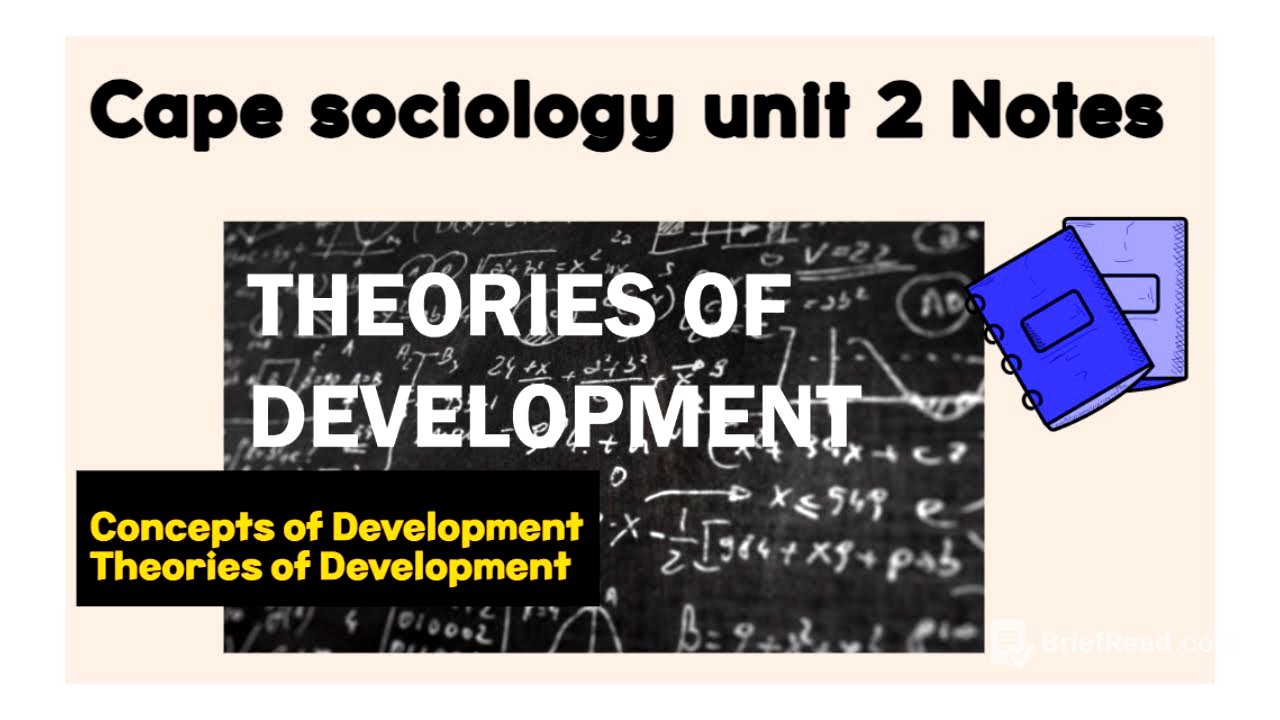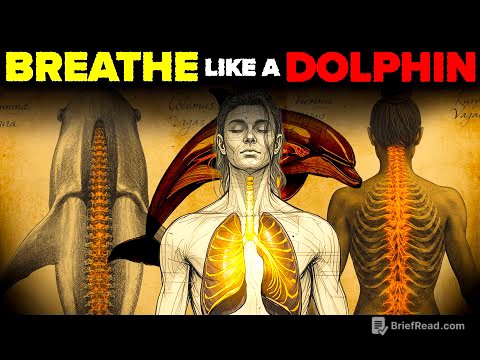TLDR;
This video provides an overview of development concepts and theoretical perspectives, including Modernization Theory, Dependency Theory, World System Theory, and Convergence Theory. It explains key terms like industrialization, GDP, GNP, and per capita income, and differentiates between economic growth and economic development. The video also discusses the characteristics of underdeveloped nations, development challenges in the Caribbean, and criticisms of each theory, offering a comprehensive understanding of development studies.
- Key development concepts and terms
- Theoretical perspectives on development
- Criticisms of each theory
Intro [0:00]
The video introduces the topic of development and its theoretical perspectives. The presenter encourages viewers to support the channel by subscribing and sharing the content. The main focus will be on the theories of development, but first, the video will run through the concepts to provide a foundational understanding.
Concepts of Development [0:41]
Development is often equated with industrialization, economic growth, and improved living standards, including increased life expectancy, healthcare, and education. It's important to consider both social and economic aspects of development. Economic development involves modernization and industrialization, while social development focuses on changes in social institutions and the well-being of people. Sustainable development aims to meet present needs without compromising future generations. Indicators of development, both economic and non-economic, are used to assess a country's progress over time.
Key terms include:
- Modernization: The process of societies undergoing industrialization, urbanization, and social changes.
- Industrialization: The transformation of a society from pre-industrial to industrial, with a fully developed economy.
- GDP (Gross Domestic Product): The total market value of finished goods and services produced within a country in a year.
- GNP (Gross National Product): The final products and services produced by a country's residents.
- Per Capita Income: The average income earned per individual in a country within a year.
Economic growth is an increase in national output and income, while economic development includes improvements in social and political welfare, literacy rates, life expectancy, and healthcare. Underdevelopment refers to a country that has not reached its maturity but has the potential to develop further. An undeveloped society has not yet developed, but there is no inherent reason why it cannot. Underdeveloped societies have been prevented from developing due to exploitation by richer countries, such as African states and Caribbean nations affected by historical colonial exploitation and economic inequalities.
Less developed nations often rely on the production of cash crops and raw materials for export, lack manufacturing industries, have low economic growth rates, and face food insecurity and poor infrastructure. Development challenges in the Caribbean include dependency on foreign capital, skills, and enterprise, a mono-crop legacy, dependence on imports and technology, domination by multinational corporations, social stratification, population transition, political factors, and the negative impacts of tourism. Poverty leads to brain drain and increased crime and violence among the younger population.
Modernization Theory [14:18]
Modernization Theory suggests that development means adopting Western cultural values and social institutions. Underdeveloped societies are seen as hindered by their value systems and institutions. Low-income countries can improve their economic standing by adjusting their cultural values and attitudes toward work, embracing industrialization, and maintaining modernization. Societies develop through evolutionary stages based on social differentiation and reintegration. Developing societies are currently in a pre-modern stage but will eventually achieve economic growth and adopt the features of Western European and North American societies. Economic growth promotes structural changes, leading to increased political representation and developed institutions.
Rostow's Stages of Modernization [16:52]
The stages of development according to Rostow are:
- Traditional Societies: Dominated by institutions like families, tribes, and clans, with roles ascribed rather than achieved. Production is mainly in agriculture.
- Preconditions for Takeoff: Involve material factors such as capital and technology from the West in the form of capital and investment by Western companies.
- Takeoff Stage: Traditional attitudes and social institutions are replaced with Western equivalents. Achievement replaces ascription, and nuclear families replace extended families.
- Drive to Maturity: Marked by the export of manufactured goods to the West as the country takes its place in the international trading system.
- Age of High Mass Consumption: People enjoy better lives, life expectancy is raised, and more citizens receive free healthcare and education.
Criticisms of Modernization Theory include:
- It undervalues traditional institutions compared to Western equivalents.
- It assumes that Western encouragement of less developed countries' elites has created inequalities in wealth and power, leading to human rights abuses.
- It is ethnocentric, assuming that economic and social progress works the same way in all countries.
The Caribbean, for example, did not experience a traditional society due to forced migration through slavery and would likely start at stage two, currently being at stage three or four due to a lack of industrialization.
The Dependency Theory [22:46]
The Dependency Theory rejects the idea that less developed countries are responsible for their failure to develop. Instead, it argues that Western nations have deliberately underdeveloped them. Andre G. Frank suggests that a global system of capitalism exists where large, developed countries exploit poor countries. These poor countries are dependent on larger states for markets for their cheap labor and goods. Historically, this was seen in colonization and slavery, where larger states benefited from plantation economies.
Contemporary international trade is based on a legacy of colonization. Most colonies have political independence but still depend on the West for their cash crops. Multinational companies use their investments to exploit other nations for cheap labor, raw materials, and new markets. Official aid and the flow of resources from one country to another can lead to serious debt and dependency.
Premises of the Dependency Theory:
- Poor nations provide a destination for obsolete technology and markets to wealthy nations.
- First-world nations actively perpetuate a state of dependence through various policies and initiatives.
- Attempts by dependent nations to resist the influence of dependency are met with resistance from core nations.
Steps to avoid dependency include:
- Promotion of domestic products by subsidizing and protecting industries within poor nations.
- Limiting the importation of luxury goods and manufactured goods that can be produced within the country.
- Governments taking steps to keep foreign companies from owning or operating property that draws on the country's resources.
- Governments forcibly taking over foreign-owned companies on behalf of the state to keep profits within the country.
Criticisms of the Dependency Theory:
- Corruption is more prevalent in state-owned industries compared to privately owned industries.
- Lack of competition due to subsidizing in-country industries and preventing outside imports.
- It may ignore the specific histories and development of countries.
- It does not explain other factors that lead to underdevelopment and seemingly blames wealthy nations for the ills of underdeveloped countries.
- Dependency does not always lead to underdevelopment; some countries' dependency ensures they become developed over time.
World System Theory [36:30]
The World System Theory, developed by Immanuel Wallerstein, argues that individual countries are not adequate units of analysis. Instead, we must look at the overall social system that transcends national boundaries, which he calls the modern world system. This system is characterized by a single world economy that is capitalist, although it has no common political structure.
Wallerstein uses four concepts:
- Core Nations: Dominant capitalist countries that are highly industrialized, technological, and urbanized.
- Semi-Peripheral Nations: Countries that exhibit intermediate levels of development, situated between the core and the periphery.
- Peripheral Nations: The least developed nations, often characterized by reliance on primary commodities, low levels of industrialization, and exploitation by core nations.
- External Area: Regions outside the capitalist world economy, including pre-capitalist societies and nations not fully integrated into the global economic system.
Differences between Dependency Theory and World System Theory:
- Dependency Theory posits a static global hierarchy where poor countries are perpetually dependent on and exploited by wealthier nations.
- World System Theory acknowledges the potential for poor countries to advance within the world economy through the concept of the semi-periphery.
- World System Theory suggests that development and underdevelopment result from the unequal distribution of power and resources within the world economy.
The theory suggests that some societies dominate others in the pursuit of resources and economic advantage, leading to intensified inequalities and perpetuating the state of dependence for third-world countries.
Convergence Theory [43:27]
The Convergence Theory of development is based on the premise that as countries develop, they adopt or exhibit characteristics similar to developed nations. Countries transition from utilizing industrialization to becoming highly industrialized over time. It means how underdeveloped countries catch up to developed countries when they implement measures to develop, leading to a global culture in which all developed countries have the same cultural patterns.
This theory ignores the fundamental differences between countries, such as China and the United States, which are both industrialized but exhibit different cultures, belief systems, and values. Kerr believed that the more industrially developed countries of the world would converge into a single mass industrial society modeled along the lines of the USA.
Kerr proposed that industrial societies would progress through four stages:
- Increasing social mobility.
- Employees selected by merit.
- Decreasing differences between statuses.
- Expansion of the middle class.
Evaluation of the theory:
- While technological advancements have facilitated a sense of global convergence, critics challenge the assumption of a universal path of development.
- Critics also point out that the theory disregards the complexities of individual nations and their unique histories and contexts.
- Convergence Theory assumes that all countries must evolve along the same lines as the West.









